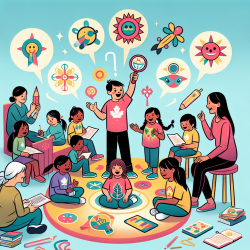As practitioners in the field of online therapy, particularly for students with special needs, it is essential to continuously seek methods to improve service delivery and outcomes. A valuable resource in this endeavor is the research paper titled Development of an outcome measurement system for service planning for children and youth with special needs. This paper outlines a comprehensive approach to developing and implementing an outcome measurement system that can significantly enhance service planning and delivery.
The study, conducted by Kertoy et al. (2013), describes the process of creating an outcome measurement framework for children with special needs in a Canadian province. The framework aims to improve service planning and delivery by incorporating feedback from families and service providers. Here are some key takeaways from the research that can help you enhance your practice:
1. Develop a Theoretical Framework
The research highlights the importance of using a theoretical framework to guide the development of an outcome measurement system. The International Classification of Functioning, Disability and Health (ICF) and the ecological model of child-in-family-in-community were identified as effective frameworks. These models emphasize the importance of considering the child's activities, participation, and environmental factors, as well as the needs and goals of the family.
2. Engage Key Stakeholders
Involving key stakeholders, including researchers, service providers, government agencies, and families, is crucial in developing a robust outcome measurement system. The study found that stakeholder consultations helped build valuable partnerships and identified potential barriers to implementation. Engaging stakeholders ensures that the system reflects the perspectives of multiple users and gains broader support.
3. Select Appropriate Outcome Measures
The research identified three feasible outcome measures for families to complete: the Measure of Processes of Care (MPOC-20), the Craig Hospital Inventory of Environmental Factors (CHIEF), and the Supports and Services Questionnaire. These measures provided valuable information about service delivery and were highly rated by families for their utility. Selecting measures that are valid, reliable, and appropriate for collecting information about children of varying diagnoses and ages is essential.
4. Pilot Test the System
Pilot testing the selected measures is a critical step in determining their feasibility, acceptability, and utility. The study's pilot testing showed that the measures were feasible to administer and provided useful information for both families and service providers. Pilot testing also helps identify any challenges or areas for improvement before full implementation.
5. Interpret Data Within Local Context
It is important to interpret the data collected from outcome measures within the local context to ensure accurate and meaningful insights. The study emphasized that service providers and policymakers should consider local factors when analyzing data to identify genuine gaps in services and areas for improvement.
6. Foster Ongoing Communication
The research highlighted the need for better communication and integration of services between different service providers and community agencies. Establishing an outcome measurement system can help identify gaps in service delivery and promote ongoing discussions between families, service providers, and government agencies to improve coordination and planning.
By implementing these strategies, online therapy practitioners can enhance their service delivery and better meet the needs of students with special needs. Continuous improvement and adaptation based on outcome measurement data will lead to more effective and family-centered services.
To read the original research paper, please follow this link: Development of an outcome measurement system for service planning for children and youth with special needs.










